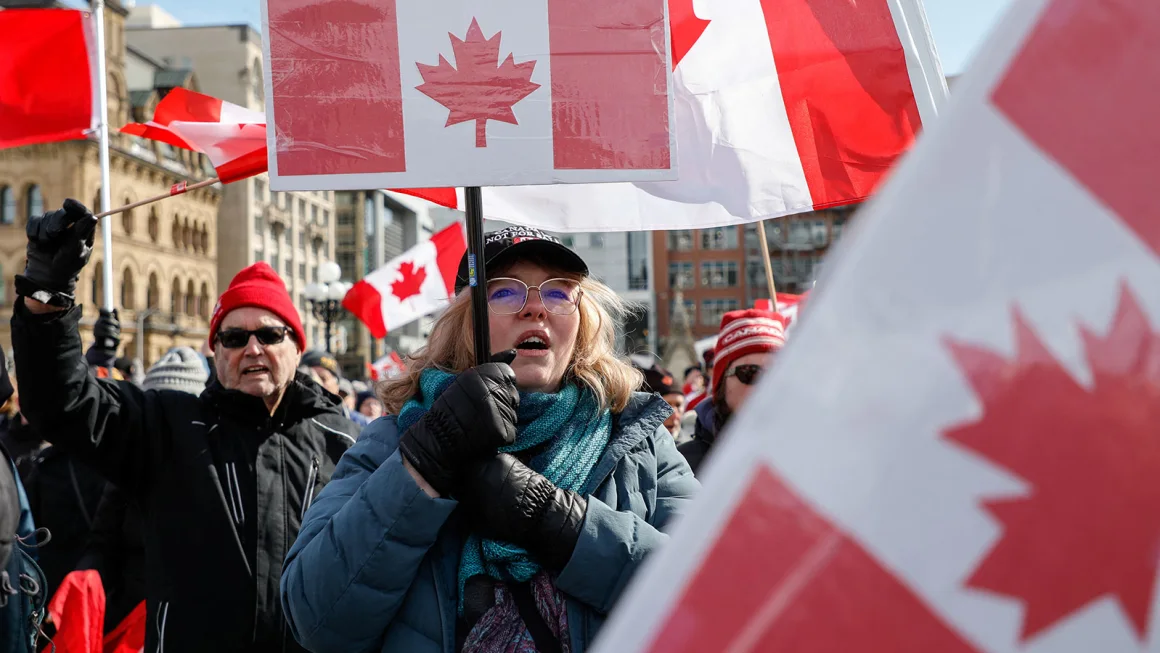
It used to sound like a joke when President Donald Trump talked about making Canada the 51st US state, but to Canadian leaders it sounds like an increasingly serious threat and part of a plan.
“President Trump wants to put us into a state where we are much more weakened economically in order eventually to annex us,” Canadian Foreign Minister Mélanie Joly told CNN’s Christiane Amanpour last week.
Certainly, the idea of one country taking over the democracy next door would be alarming to the smaller country, particularly after years watching Russia’s invasion of Ukraine, although Trump has not suggested the use of military force.
At the same time, he continues to bring up the prospect of the US absorbing Canada.
“The artificial line of separation drawn many years ago will finally disappear,” Trump said, mangling history during a standoff with Ontario’s premier that threatened to open a new front in the trade war Tuesday. He also promised Canada could keep its anthem, “O Canada.”
That was the “good cop” post. Trump also issued threats in the period before Ford backed down from a threatened surcharge on electricity sold across the border to Americans in Minnesota, Michigan and New York. Instead, Ford will meet with US Commerce Secretary Howard Lutnick. Trump suggested he would back down on a threatened doubling of tariffs on steel and aluminum. Read more about the tariff threat.
Canadians are confused and hurt by Trump’s trade war
“This is absolute chaos created by one person and that’s Donald Trump,” Ford told CNN’s Wolf Blitzer on Tuesday, before the parties had agreed to de-escalate. Ford added Canada would never be a state and “is not for sale.”
Trump, in his social media posts, also added a demand to the escalating tit-for-tat trade war that Canada drop steep tariffs on US dairy exports, although CNN’s fact-checker Daniel Dale notes Trump’s complaint is effectively untrue.
From Dale: Those high tariffs kick in only after the US has hit a certain Trump-negotiated quantity of tariff-free dairy sales to Canada each year — and as the US dairy industry acknowledges, the US is not hitting its allowed zero-tariff maximum in any category of dairy product.
“Obviously it gets under his skin,” Ford said of the dairy tariff. “Let’s sit down and talk about it. It’s as simple as that,” he added, arguing for a negotiation of the US-Mexico-Canada Agreement, the trade deal Trump negotiated during his first term.
It’s not clear what sparked Trump’s obsession with making Canada the 51st state, but there are several theories.
The New York Times, searching for a reason why Trump turned on America’s neighbor to the north, pointed to the bankruptcy of two hotels that bore his name — in Toronto in 2016 and Vancouver in 2021.
There is also the viral photo from Trump’s first term of Melania Trump preparing to peck Canadian Prime Minister Justin Trudeau on the cheek, although the video made clear that was nothing more than a greeting.
But there’s no long-standing frustration or gripe in Donald Trump’s old tweets, which can sometimes be a clue to his frustrations.
“This is not only a personal issue between Prime Minister Trudeau and President Trump; it’s way more than that,” Joly told Amanpour. “It is much more than just the political rhetoric. It is a fundamental threat,” she said, adding that one result will be the breaking down of barriers to trade between Canadian provinces and closer relationships with Europe.
During his first term, Trump spent a lot of time bragging about the USMCA, the trade pact he negotiated but is now breaking by imposing new tariffs on Canada and Mexico.
Most Americans may not give much thought to Trump’s idea to turn Canada into a state, but Canadians are taking this very seriously, as anyone who has seen booing at NHL games or removal of US booze from Canadian shelves will tell you.
Nobody in the US is talking about an invasion force, but most Canadians (63%) say Trump should be taken seriously in a survey conducted by Leger for the Association for Canadian Studies. A little more than half say they would defend Canada from military invasion.
More important is the striking drop in the number of Canadians who view the US favorably, from more than 50% in June to one-third today.
Canada’s population exceeds that of California, the most populous US state, and if it were admitted to the US as a single entity rather than as 10 separate provinces, it would instantly upend the political equilibrium in today’s nearly evenly divided US system.
It’s relatively simple in the Constitution to welcome a state into the US, but it hasn’t been done since 1959, when Hawaii and Alaska both became states.
The addition of those two states at nearly the same time helped maintain equilibrium in the US. Back then, Alaska veered toward Democrats and Hawaii veered toward Republicans, according to a Senate history. That’s the opposite of today’s political picture.
Both were also small states, and both held a plebiscite to guarantee that local voters agreed with becoming a state, something most Canadians seem to oppose. For starters, it’s an intentionally bilingual country, and Trump recently declared English the national language of the US.
“We were part of the British Empire because we didn’t want to be the United States,” Joly told Amanpour.

